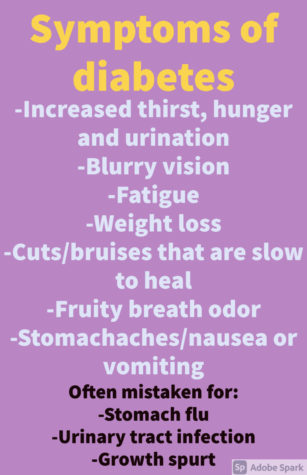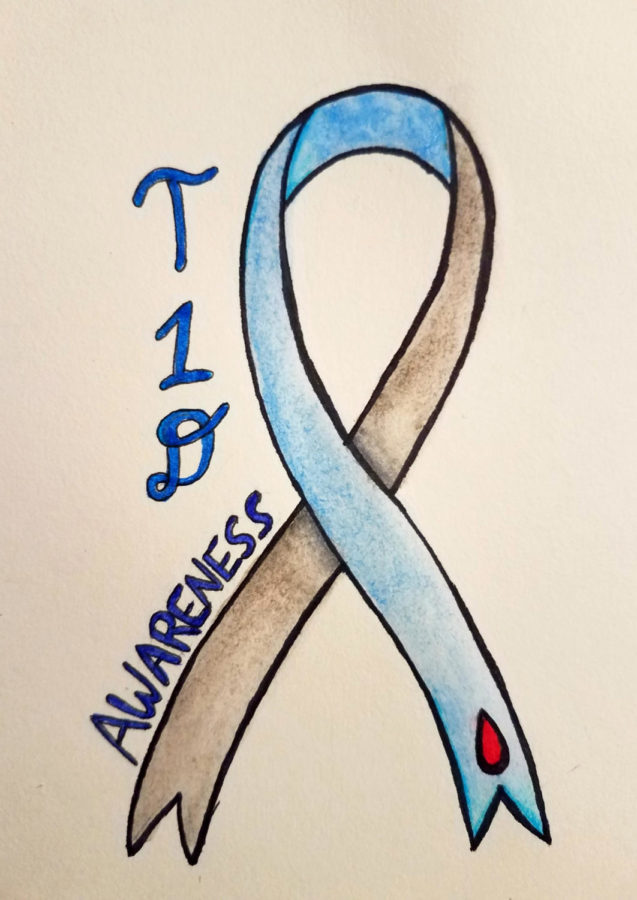‘You Can’t Eat Sugar, Right?’ 4 Myths About Diabetes, Dispelled
November 29, 2021
“You can’t eat sugar, right?” As a person living with type 1 diabetes, I’ve heard this multiple times; however, it is one of the many misconceptions surrounding diabetes. November is diabetes awareness month, which makes it the perfect time to debunk some of these common myths.
1. There is a “good” and “bad” kind of diabetes.
Who came up with this idea? I don’t think there is a “good” kind of diabetes. A lot of people are unclear on the differences between type 1 and type 2 diabetes, as they are often used interchangeably. However, they are two very different diseases. Only 5-10% of people with diabetes have type 1. Type 1 is an autoimmune disease; people with this type are dependent on insulin for the rest of their lives — either through injections or a pump. Type 2 can often be managed with diet and exercise. Each comes with its own set of challenges: One is not better than the other.
2. Diabetics can’t eat carbs or sugar.
This might be the one I hear the most! Contrary to popular belief, sugar is NOT harmful to people with type 1 diabetes (at least it’s not any worse than it is for anyone else!) I need to know how many carbs are in any food I’m eating to take the correct amount of insulin, and sometimes it does make my blood sugar spike, which is frustrating. But I’ve been known to eat my fair share of candy over the years. Those with type 2, however, are often advised to reduce their carbohydrate intake, so it’s important to make a distinction between the two types.
3. Diabetes is caused by eating too much junk food.
There is a stigma surrounding diabetes because of this myth: The idea a person did something wrong to get diabetes. Type 1 occurs when the body’s immune system attacks the insulin-producing cells in the pancreas. The person’s body will no longe r make insulin, which helps break down carbohydrates. At this time, experts don’t know why this occurs, and nothing can be done to prevent it. They do know, however, that it has nothing to do with what a person did or did not eat. Type 2 can be a result of lifestyle choices, but genetics also play a role in its development. It occurs when a person’s body builds up resistance to insulin over time. Regardless, someone should not be blamed for either type!
r make insulin, which helps break down carbohydrates. At this time, experts don’t know why this occurs, and nothing can be done to prevent it. They do know, however, that it has nothing to do with what a person did or did not eat. Type 2 can be a result of lifestyle choices, but genetics also play a role in its development. It occurs when a person’s body builds up resistance to insulin over time. Regardless, someone should not be blamed for either type!
4. An insulin pump means you don’t need to do any work.
If you don’t have diabetes, it’s easy to assume that if you get a pump, it does everything for you. Pumps eliminate the need for injections. They are a huge help for people who choose to use them; however, they still have to constantly find a balance between too much and too little insulin, and blood sugar that is too low or too high. It’s not impossible, and technology like insulin pumps and continuous glucose monitors can help, but it still takes a considerable amount of mental and physical energy. Unlike most health conditions, diabetes is managed primarily by the patient, rather than the doctor.
Busting some of these myths will help decrease the stigma around both types of diabetes. If you want to know more about it, websites like CDC and the American Diabetes Association have great information. Educating yourself is one of the best ways to support someone with diabetes.



